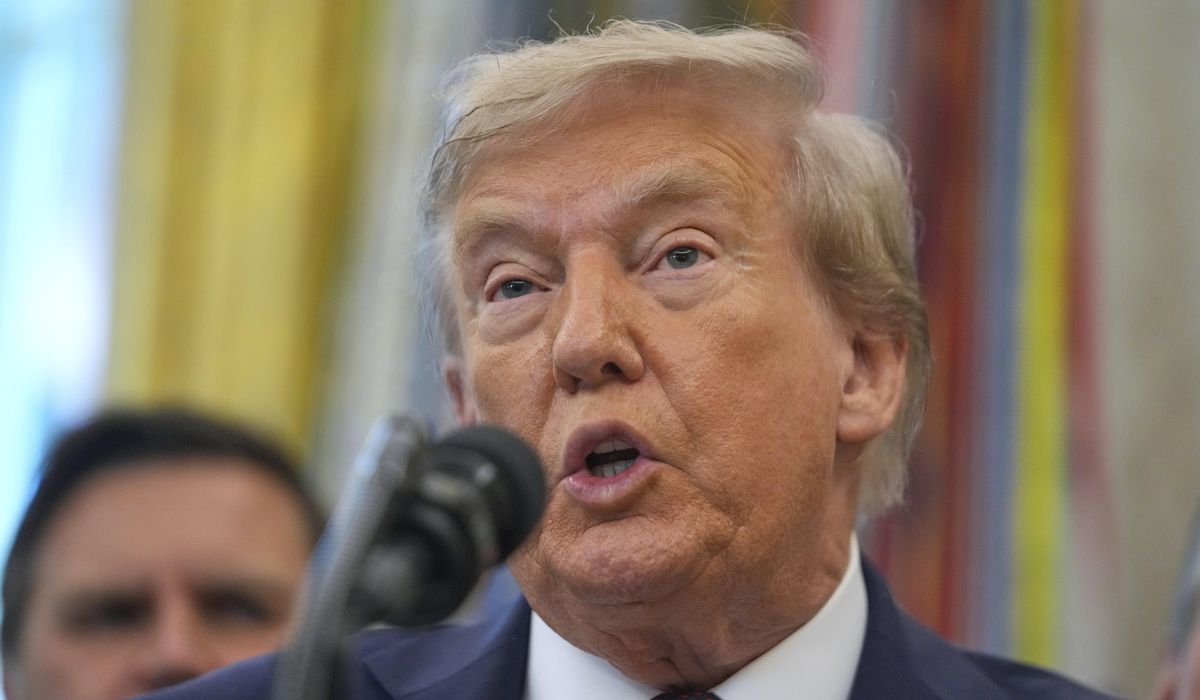


President Trump urged European leaders on Thursday to stop buying Russian oil that helps Moscow fund its war against Ukraine, a White House official said.
Mr. Trump joined via phone call a meeting of leaders of European countries led by French President Emmanuel Macron who are offering security guarantees to Ukraine in the event of a peace deal with Russia. Ukrainian President Volodymyr Zelenskyy was among those who attended the Paris meeting.
“President Macron and European leaders called President Trump into their ’Coalition of the Willing’ meeting. President Trump emphasized that Europe must stop purchasing Russian oil that is funding the war, as Russia received 1.1 billion euros in fuel sales from the EU in one year,” the official said.
“The president also emphasized that European leaders must place economic pressure on China for funding Russia’s war efforts,” said the official.
The EU, which has partnered with the U.S. to impose severe sanctions on Moscow, still imported $41.9 billion in goods from Russia last year, according to data from the bloc’s statistics agency, Eurostat.
Russia was the largest supplier of petroleum to the European Union before the war began. Europe has eased off Russian oil since the Russian President Vladimir Putin ordered the invasion of Ukraine in February 2022, but Europe still imports billions in oil products from Russia.
Russian oil imports to Europe were $1.72 billion in the first quarter of 2025, which is a dramatic drop from $16.4 billion during the first quarter of 2021, according to Eurostat data.
Europe has only slightly reduced its dependence on natural gas imports from Russia. In the first quarter of 2025, Russia accounted for about 19% of natural gas imported to Europe, down from 22% in 2021. In fact, the value of Russian gas imports has increased over the past four years because of price increases, reaching $5.24 billion in this year’s first quarter.
Iron, steel and fertilizer are among the other products Russia imports to the European Union.
Overall trade between Russia and the EU has dropped by 86% between the first quarter of 2022 and 2025, Eurostat data showed.
The European Commission has proposed legislation to phase out EU imports of Russian oil and gas by January 1, 2028, but severing its decades-old energy ties with Moscow has proven tricky.
Mr. Trump has already taken sharp aim at countries purchasing Russian oil. Last month he imposed a 50% tariff on most U.S. imports from India, making good on his threat to punish India over its purchases of Russian oil.
India was a nominal buyer of Russian oil before the war in Ukraine began in February 2022. Moscow has since become India’s top oil supplier. That’s because the Group of Seven nations, representing the world’s top economies, capped Russian oil exports at $60 per barrel in December 2022.
The export cap made Russian oil more affordable for India, which has long sought to reduce its massive crude oil bill and provide energy at affordable rates for its 1.4 billion citizens.
Mr. Trump last week said he would wage an “economic war” against countries that are purchasing goods, especially oil, from Russia. Moscow is using the proceeds from its trade partners to fund its Ukraine war.
“It will not be a world war, but it’ll be an economic war, and an economic war is going to be bad. It’s going to be bad for Russia, and I don’t want that,” Mr. Trump said Tuesday.
When Mr. Zelenskyy arrived at the meeting Thursday, he was greeted warmly by Mr. Macron, who pledged full cooperation in offering security guarantees for post-war Ukraine.
“We are ready as Europeans to offer security guarantees to Ukraine and the Ukrainian people, the day a peace deal is signed,” Mr. Macron said.
“The contributions that were prepared, documented and confirmed this afternoon at the level of the defense ministers in an extremely confidential manner allow me to say the preparatory work is complete,” Mr. Macron said.
Other European leaders attending Thursday’s talks in Paris were European Commission President Ursula von der Leyen, European Council President António Costa, Finnish President Alexander Stubb, Danish Prime Minister Mette Frederiksen and Polish Prime Minister Donald Tusk. Several other European leaders joined the meeting virtually.
• Jeff Mordock can be reached at jmordock@washingtontimes.com.
